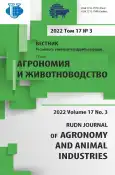Promising cultivars of winter triticale for grain production in the north-west of the Astrakhan region
- Авторлар: Fedorova V.A.1
-
Мекемелер:
- Precaspian Agrarian Federal Scientific Center of the Russian Academy of Sciences
- Шығарылым: Том 17, № 3 (2022)
- Беттер: 251-262
- Бөлім: Crop production
- URL: https://journal-vniispk.ru/2312-797X/article/view/315625
- DOI: https://doi.org/10.22363/2312-797X-2022-17-3-251-262
- ID: 315625
Дәйексөз келтіру
Толық мәтін
Аннотация
Triticale, due to its specific properties to form stable grain yields in the zones with risky agriculture, should find wider application in acutely arid conditions. Therefore, the use of highly productive cultivars of winter triticale in semi-desert zone of the north-west of the Astrakhan region is relevant. The aim of the research was a comprehensive assessment of promising winter triticale cultivars of different ecological and geographical origin for adaptability to stressful meteorological factors in semi-desert zone of the northwestern Astrakhan region. To determine the main indicators of adaptability (winter hardiness, plasticity, stability, stress tolerance, genetic flexibility), six promising winter triticale cultivars (Tribun, Interes, PRAG 152, Khleborob, Zhnets and Uragan) were studied. Field agroecological tests were conducted on rainfed fields of Precaspian Agrarian Federal Scientific Center of the RAS with different moisture level in 2018-2020. Nelli cultivar was used as a control. The methods of Selyaninov G.T., Zhivotkov L.A., Eberhart S.A., and Rassell W.A. were used for calculations. During periods of active vegetation of winter triticale, Selyaninov hydrothermal coefficient varied from 0.3 to 0.5 (zone of strong and very strong drought); environment index was from -0.67 to 0.66. According to the data obtained, cv. Khleborob showed the greatest adaptive potential and consistently high yield under various meteorological conditions of the season compared to the other tested winter triticale varieties. Moreover, the cultivar had good winter hardiness (5 points) and survival (90.8 %). On the average for the years of research it showed high adaptability coefficient (1.43), and the indicators of its plasticity and genetic flexibility were 0.77 and 1.40, respectively. Therefore, cv. Khleborob can be recommended for use in the acutely arid conditions in semi-desert zone of the northwestern part of the Astrakhan region.
Авторлар туралы
Valentina Fedorova
Precaspian Agrarian Federal Scientific Center of the Russian Academy of Sciences
Хат алмасуға жауапты Автор.
Email: fedorova59.61@mail.ru
ORCID iD: 0000-0001-5998-425X
Candidate of Agricultural Sciences, Senior Researcher, Laboratory of Plant Resources, Department of Agriculture and Integrated Land Reclamation
8 Severny block, Solenoye Zaymishche vil., Chernoyarsk district, Astrakhan region, 416251, Russian FederationӘдебиет тізімі
- Zhuchenko AA. Adaptivnoe rastenievodstvo (ekologo-geneticheskie osnovy): teoriya i praktika. T.1 [Adaptive crop production (ecological and genetic foundations): theory and practice. Vol.1]. Moscow: Agrorus publ.; 2008. (In Russ.).
- Rybas IA. Breeding grain crops to increase adaptability. Agricultural biology. 2016; 51(5):617—626. (In Russ.). doi: 10.15389/agrobiology.2016.5.617rus
- Nazranov HM, Nagudova FH, Kalmykov AM. Complex estimation of winter triticale adaptive potencial in the conditions of the Northern Caucasus central part vertical zonation. Bulletin of KSAU. 2011; (11):71—75. (In Russ.).
- Goncharenko AA. On adaptivity and ecological resistance of grain crop varieties. Vestnik of the Russian agricultural science. 2005; (6):49—53. (In Russ.).
- Shipak GV, Svyatchenko SI, Nichiporuk EA, Shipak VG, Shipak VV, Vos H, et al. Results of triticale selection for improvement of baking properties. In: Triticale. In: Breeding, genetics, agricultural technology and technologies for processing raw materials: conference proceedings. Rostov-on-Don; 2021. p.43—65. (In Russ.). doi: 10.34924/FRARC.2020.13.52.001
- Fedorova VA. Ecological plasticity of winter triticale cultivars in the North-Western Caspian region. Theoretical and applied problems of agro-industry. 2020;(1):21—24. (In Russ). doi: 10.32935/2221-73122020-43-1-21-24
- Makarov MR. The relevance of obtaining new varieties of winter triticale adapted to the conditions of a particular region. Bulletin of Science and Practice. 2019; 5(4):206—210. (In Russ). doi: 10.33619/2414-2948/41/25
- Surin NA, Mihareva OG. The use of adaptability criteria in the evaluation of new varieties of grain crops in the system of state variety testing. In: Problems of desertification and protection of biological diversity of natural and economic complexes of arid regions of Russia: conference proceedings. Moscow: Sovr. Tetradi publ.; 2003. p.127—132. (In Russ.).
- Eberhart SA, Russell WA. Stability parameters for comparing varieties. Crop science. 1966; 6(1):36—40. doi: 10.2135/cropsci1966.0011183X000600010011x
- Zhivotkov LA, Morozova ZA, Sekatueva LI. Methodology for identifying the potential productivity and adaptability of varieties and breeding forms of winter wheat in terms of «Yield». Selektsiya i semenovodstvo. 1994; (2):3—6. (In Russ.).
- Rossielle AA, Hamblin J. Theoretical aspects of selection for yield in stress and nonstress environments. Crop Science. 1981; 21(6):943—946. doi: 10.2135/cropsci1981.0011183X002100060033x
- Selyaninov GT. On agricultural climate assessment. In: Proceedings on agricultural meteorology. Vol.20. 1928. p.169—178. (In Russ.).
- Mamaev VV, Nikiforov VM. Ocenka urozhajnosti, adaptivnosti, e’kologicheskoj stabil’nosti i plastichnosti sortov ozimoj pshenicy v usloviyax Bryanskoj oblasti. Bulletin of the Kursk State Agricultural Academy. 2015; (7):125—129. (In Russ.).
- Sapega VA, Tursumbskova GS, Sapega SV. Productivity and parameters of stability of grades of grain crops. Achievements of science and technology in agro-industrial complex. 2012; (10):22—26. (In Russ.).
- Sapega VA. Productivity and parameters of intensity and stability of spring barley varieties. Grain economy of Russia. 2017; (3):36—39. (In Russ.).
- Yusova OA, Nikolaev PN, Bendina YB, Safonova IV, Aniskov NI. Stress resistance in barley cultivars of various agroecological origin under extreme continental climate conditions. Proceedings on applied botany, genetics and breeding. 2020; 181(4):44—55. (In Russ.). doi: 10.30901/2227-8834-2020-4-44-55
Қосымша файлдар










